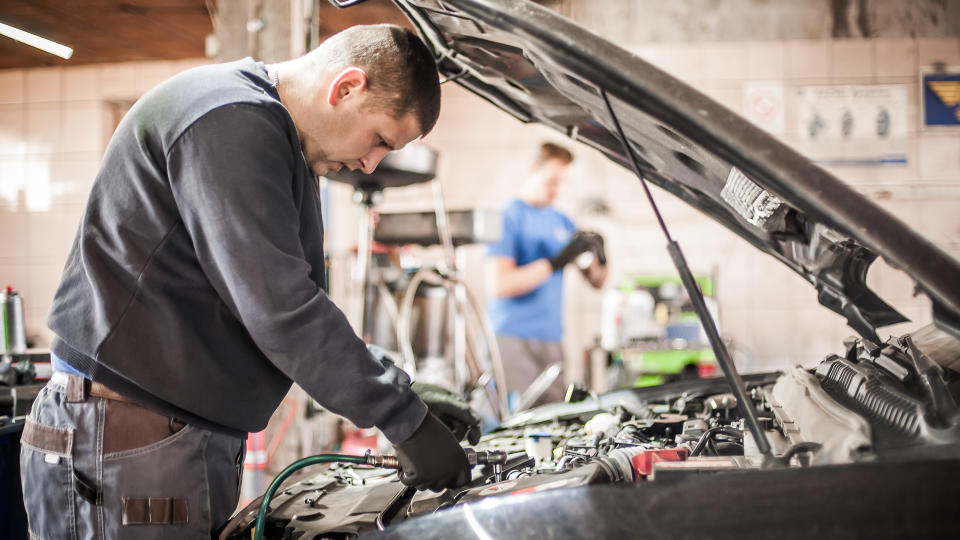5 Common Car Maintenance Myths — and Why Believing Them Could Be Costly

Car maintenance is essential for ensuring your vehicle’s longevity, safety and performance. But some car owners fall prey to common car maintenance myths that can lead to unnecessary expenses and potential damage.
For You: 7 Reliable Car Brands the Middle Class Should Consider To Save Money in the Long Run
Find Out: How To Get $340 Per Year in Cash Back on Gas and Other Things You Already Buy
1. You Don’t Need To Maintain Your Newer Car
A popular myth among car owners is that newer models don’t require regular maintenance. It’s easy to assume this when newer cars have more advanced features and are said to be built stronger and better than previous models.
Explore More: 5 Luxury Cars Mechanics Do Not Recommend
However, even the most advanced and modern vehicles need regular check-ups to ensure that everything is running smoothly, according to Chase Auto. New cars still have complex mechanical and electronic systems that can experience wear and tear over time. Neglecting basic maintenance like oil changes, brake inspections and tire rotations can lead to more issues down the road.
2. Your Car Needs an Oil Change Every 3,000 Miles
An old but common car maintenance myth is that all vehicles need an oil change every 3,000 miles. This rule has been passed down through generations, but it no longer holds true for most modern cars.
Thanks to advancements in engine technology and oil formulations, many cars today can go 5,000 to 7,500 miles, and some even up to 10,000 miles, between oil changes. The best way to determine the right oil change interval for your car is to consult the owner’s manual, Chase Auto advised.
3. Synthetic Oil Is a Waste of Money
Another car maintenance myth is that synthetic oil is unnecessary, and conventional oil is sufficient for all types of engines. Some car owners may even believe that synthetic oil is just a marketing gimmick to get them to spend more.
In reality, synthetic oil does offer superior protection, especially in extreme temperatures and conditions. It provides better lubrication and reduces engine wear, which can be particularly beneficial for high-performance or turbocharged engines. While it might be more expensive upfront, the long-term benefits often outweigh the initial cost.
4. A/C Uses More Gas Than Driving With Open Windows
Some car owners believe that rolling down the windows instead of using the air conditioning will significantly improve fuel economy. This idea stems from the belief that the A/C puts extra load on the engine, thereby consuming more fuel.
While it’s true that using the A/C can slightly reduce fuel efficiency, driving with the windows down creates aerodynamic drag. At higher speeds, this drag can offset the fuel savings from not using the A/C. A Consumer Reports study cited by Advance Auto Parts found that the difference in fuel economy between these two options is minimal, especially at highway speeds.
5. Driving With a Cold Engine Can Damage Your Car
A long-standing myth is that cars need to be idle for several minutes to warm up before driving in cold weather. Many people think this practice is necessary to get the engine and other components of the car ready for driving.
Modern engines are designed to operate efficiently almost immediately after starting. Idling for extended periods in cold weather is not necessary and can actually cause harm. Driving gently for the first few minutes will warm up the engine more effectively than idling, according to Chase Auto.
Debunking these common car maintenance myths can save you from costly mistakes and ensure your vehicle remains in a better condition overall. If you’re ever in doubt, review your vehicle’s owner’s manual or speak with a trusted mechanic to get accurate information tailored to your vehicle.
More From GOBankingRates
In Less Than a Decade, You Won't Be Able To Afford Homes in These 20 Arizona ZIP Codes
These 10 Used Cars Will Last Longer Than an Average New Vehicle
Trying to Build Your Savings? Make Sure Your Account Does These 6 Things
This article originally appeared on GOBankingRates.com: 5 Common Car Maintenance Myths — and Why Believing Them Could Be Costly

 Yahoo Finance
Yahoo Finance 